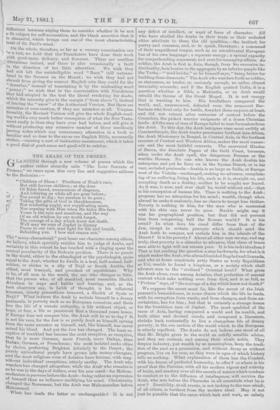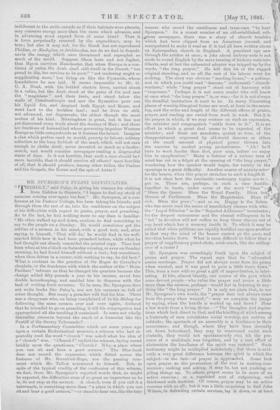G THE ARABS OF THE DESERT. LANCING through a new volume
of poems which the author rather absurdly calls " The Love Sonnets of Proteus," we came upon this very fine and suggestive address to the Bedouins :— The " many-charactered " poet bears one character among others, we believe, which specially entitles him to judge of Arabs, and certainly in this sonnet he has touched with a ringing spear the central peculiarity of the Bedouin. position. There is no puzzle in the world, either to the ethnologist or the psychologist, quite equal to the Arab, whether he dwells in a tent, half-nomad, half- robber, or abides in a city of Nejd or South Arabia, the oldest, most tranquil, and proudest of republicans. Why is he, of all men in the world, the one who changes so little, that the person who, of all mankind, most resembles Sheikh Abraham in ways and habits and bearing, and, as the best observers say, in habit of thought, is his collateral kinsman, ninety generations removed, a Sheikh of Syria or Nejd P What induces the Arab to seclude himself in a dreary peninsula, in poverty such as no European conceives, and there live the life of a remote antiquity, a life without object, or hope, or fear, a life so persistent that a thousand years hence, if Europe does not conquer him, the Arab will be as to-day ? It is not his race, for the Jew is as purely Arab as himself, sprung from the same ancestor as himself, and, like himself, has never mixed his blood. And yet the Jew has changed. The least re- ceptive of mankind has become the most receptive, so receptive, that he is more German, more French, more Italian, than Italian, German, or Frenchman ; the most isolated seeks cities by choice, preferring Brighton infinitely to the Desert ; the purely agricultural people have grown into money-changers, and the most religious even of Asiatics have become, with mag- nificent individual- exceptions, utterly earthy. The Arab who wanders has changed altogether, while the Arab who remains is as he was in the days of Jethro, even his new creed—for Afahom- modanism is parvenu before the Arab—being rather an expression of himself than an influence modifying his mind. Christianity changed the Norseman, but the Arab was Mahommedan before Mahotnmed.
What has made the latter so unchangeable P It is not
" Children of Shem l Firstborn of Noah's race, But still forever children ; at the doer Of Eden found, unconscious of disgrace, And loitering on while all are gone before ; Too proud to dig ; too careless to be poor ; Taking the gifts of God in thanklessness, Not rendering aught, nor supplicating more, Nor arguing with Him when He hides His face. Yours is the rain and sunshine, and the way Of an old wisdom by our world forgot, The courage of a day which knew not death. Well may we sons of Japhet in dismay Pause in our vain mad hght for life and breath, Beholding you. I bow and reason not." any defect of intellect, or want of force of character. All who have studied the Arabs iu their tents or their secluded cities attribute to them the old qualities,—the instinct for poetry and romance, and, so to speak, literature ; a command of their magnificent tongue, such as no uncultivated European has of his own language ; a separate energy ; a special capacity for comprehending argument, and oven for managing affairs. As soldier, the Arab is first in Asia, though, from his excessive in, dividuality, he is beaten in the aggregate by an inferior people like the Turks,—" mud bricks," as he himself says," being better for building than diamonds." The Arab who wanders forth as soldier, as statesman, as trader, or, curiously enough, as sailor, almost invariably succeeds ; and if the English quitted India, it is a question whether a Sikh, a Mahratta, or an Arab would. rebuild the throne of the Great Mogul]. It is not energy that is wanting to him. His forefathers conquered the world, and, unarmoured, defeated even the armoured Bar- barians who lived only for battle, founded three empires at least, and did not retreat after centuries of contest before the Crusaders, the picked warrior emigrants of a dozen Christian lands. All the mon of iron of Europe failed to tear Jerusalem from the Arab. To this day, the Arab intriguer rises most swiftly at Constantinople, the Arab trader penetrates farthest into Africa, the Arab Missionary in Bengal, in Central Asia, in the furthest recesses of Central and Western Africa, makes the most numer-. ous and the most faithful converts. The enervated Hindoo of Dacca, the dissolute Pagan of the Gold Coast, becomes, when under the Arab spell, the dangerous Ferazee or the warlike Houssa. No one who knows the Arab doubts his enterprise, and yet he lives on in the Syrian Desert, or in his vast, secluded peninsula—Arabia is as large as India, or Europe west of the Vistula—unchanged, seeking no advance, complain- ing of no suffering, living his life, such as it is, straight on, and accepting death as a destiny, neither to be sought nor feared. As it was, is now, and ever shall be, world without end,—that is his conception of human life. Time is nothing to the Arab ; progress has no attraction for his mind ; wealth, though when abroad he seeks it zealously, has no charm to tempt him thither. Poverty is nothing to him, for the man who is contented with his skin can never be poor. Buckle might say it was his geographical position, but that did not prevent him from conquering half the Roman world P It is his creed ? In what does his creed differ from that of the Jew, except in certain precepts which should send the Arab forth to conquer, not seclude him in the islands of the Desert ? It is his poverty P About all other men we say, and say truly, that poverty is a stimulus to advance, that clans of brave men able to fight will not remain poor. It is his individualism P That is but pushing the question a step backwards, for what is it which makes the Arab, who abroad founded Bagdad and Granada, and who at home constructs petty States as truly Republican as Uri, unable to found a kingdom, or a society which shall advance men to the " civilised " Oriental level P What gives the Arab alone, even among Asiatics, that perfection of mental content which asks nothing even from God, and is so full, as " Proteus " says, of " the courage of a day which knew not death?"
We suppose the secret must lie, like the secret of the Irish peasant's homesickness, in some charm which the life lie leads, with its exemption from wants, and from changes, and from un- certainties, has for him ; but that is certainly a strange lesson for the breathless race of Japhet. The most qualified of the races of Asia, having conquered a world and its wealth, and built cities and devised creeds, and composed a literature, shrinks back contentedly to live a changeless life of dreary poverty, in the one section of the world. which to the European is utterly repellent. The Arabs do not believe one word of all that Mr. Bright gives to the world as solidly sensible advice, and they are content, and among their rivals noble. They despise industry, put wealth by as meaningless, keep the tradi- tion of the past as a possession, and without decay as without progress, live on for ever, as they were in ages of which history tells us nothing. What explanation of them has the Comtist, with his dream of perfected humanity, to offer P or where is his proof that the Parisian, with all his modern vigour and activity of brain, and mastery over all the secrets of nature which conduce to comfort or to the diffusion of intellegence, will survive the Arab, who was before the Pharaohs in all essentials what he is ACM ? Durability, at all events, is not lacking to the race which, of all others, is furthest from the modern ideal. May it not net be possible that the races which halt and wait, as calmly indifferent to the strife outside as if their habitats were planets, may conserve energy more than the races which advance, and in advancing must expend force of some kind? That it is force perpetually renewed by the expenditure, may be true; but also it may not, for the Greek has not reproduced Phidias, or /Eschylus, or Archimedes, nor do we find in Scandi- uavia the energy which once threatened and repoopled so much of the world. Suppose Sheet lasts and not Japhot, that Mecca survives Manchester, that when Europe is a con- tinent of ruins, the Arab shall still dwell in the Desert, "too proud to dig, too careless to be poor," "not rendering aught or supplicating more," but living on like the Pyramids, whose foundations he saw laid. It seems impossible to Mr. G. 0. A. Head, with his bottled electric force, carried about in a valise, but the Arab stood at the gates of On and saw the " magicians " and their feats, and stood below the walls of Constantinople and saw the Byzantine pour out his liquid fire, and despised both Egypt and Rome, and went back to the. herblese land ; and he lives on still, not advanced, not degenerate, the ablest though the most useless of his kind. Birmingham is great, but it has not yet discovered every truth about the destiny of Man ; and there are fractions of humankind whose governing impulses Western Europe as little comprehends as it foresees the future. Imagine a clan which prefers sand to mould, poverty to labour, solitary reflection to the busy hubbub of the mart, which will not earn enough to clothe itself, never invented so much as a lucifer- match, and would consider newspaper-reading a disgraceful waste of time. Is it not horrible, that such a race should be ? more horrible, that it should survive all others ? most horrible of all, that it should produce, among other trifles, the Psalms and the Gospels, the Koran and the epic of Autar ?



































 Previous page
Previous page